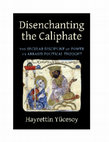Books by Hayrettin Yücesoy

Disenchanting the Caliphate: The Secular Discipline of Power in Abbasid Political Thought, 2023
The political thought of Muslim societies is all too often defined in religious terms, in which t... more The political thought of Muslim societies is all too often defined in religious terms, in which the writings of clerics are seen as representative and ideas about governance are treated as an extension of commentary on sacred texts. Disenchanting the Caliphate offers a groundbreaking new account of political discourse in Islamic history by examining Abbasid imperial practice, illuminating the emergence and influence of a vibrant secular tradition.
Closely reading key eighth-century texts, Hayrettin Yücesoy argues that the ulema’s discourse of religious governance and the political thought of lay intellectuals diverged during this foundational period, with enduring consequences. He traces how notions of good governance and reflections on prudent statecraft arose among cosmopolitan literati who envisioned governing as an art. Competent in nonreligious branches of knowledge and trained in administrative professions, these belletrists articulated and defended secular political practices, reimagining the caliphal realm as politically constituted rather than natural. They sought to improve administrative efficiency and bolster state control for an empire made up of diverse cultures. Their ideas about moral cultivation, temporal reasoning, and governmental rationality endured for centuries as a counterpoint to religious rulership. Drawing on this history, Yücesoy critiques the concept of “Islamic political thought,” calling for decolonizing debates about “secular” and “religious” politics.
Theoretically rich and historically grounded, Disenchanting the Caliphate is an insightful and provocative reconsideration of key strands of political discourse in the intellectual history of Muslim societies.
Journal Articles by Hayrettin Yücesoy
World History Bulletin, 2023

This article examines the historical work of the ninth-century Muslim scholar Ab u _ Han ıfa al-D... more This article examines the historical work of the ninth-century Muslim scholar Ab u _ Han ıfa al-D ınawar ı. Adopting the format of universal history, al-D ınawar ı constructed a historical narrative beginning with the first human Adam, continuing through the rise of Islam and culminating in the Caliphate. This paper argues that al-D ınawar ı's work, appropriately entitled Longer narratives, represented an attempt to configure Islamic polity into world history through a reorientation of Sasanian imperial ideology and geographical consciousness in order to fit Islamic sensibilities. As an early example of belles-lettres (adab) oriented (belletrist, adab ı) universal historiography, al-D ınawar ı's work comes across as a perceptive outlook on history, which proved relevant to dynasties of diverse origins struggling to carve a space for themselves in the Persianate political landscape of the late and post-< Abb asid world.
Book Chapters by Hayrettin Yücesoy
Encyclopedia Entries by Hayrettin Yücesoy
Excerpt from Encyclopedia of Islam, 3rd Edition-2016
Book Reviews by Hayrettin Yücesoy
American Historical Review, 2021
This review roundtable comprises seven distinctive reviews of The Wiley Blackwell History of Isla... more This review roundtable comprises seven distinctive reviews of The Wiley Blackwell History of Islam, an edited reference work consisting of twenty-eight essays covering a wide range Islamic teaching, practice, and social and political life from before the religion’s birth in the seventh century until the present. Convened by Hatsuki Aishima, a scholar of modern Islam based at Japan’s National Museum of Ethnology, the seven reviews are followed by a response from Armando Salvatore (McGill University), one of the volume’s three editors.
American Historical Review, 2021
This review roundtable comprises seven distinctive reviews of The Wiley Blackwell History of Isla... more This review roundtable comprises seven distinctive reviews of The Wiley Blackwell History of Islam, an edited reference work consisting of twenty-eight essays covering a wide range Islamic teaching, practice, and social and political life from before the religion’s birth in the seventh century until the present. Convened by Hatsuki Aishima, a scholar of modern Islam based at Japan’s National Museum of Ethnology, the seven reviews are followed by a response from Armando Salvatore (McGill University), one of the volume’s three editors.











Uploads
Books by Hayrettin Yücesoy
Closely reading key eighth-century texts, Hayrettin Yücesoy argues that the ulema’s discourse of religious governance and the political thought of lay intellectuals diverged during this foundational period, with enduring consequences. He traces how notions of good governance and reflections on prudent statecraft arose among cosmopolitan literati who envisioned governing as an art. Competent in nonreligious branches of knowledge and trained in administrative professions, these belletrists articulated and defended secular political practices, reimagining the caliphal realm as politically constituted rather than natural. They sought to improve administrative efficiency and bolster state control for an empire made up of diverse cultures. Their ideas about moral cultivation, temporal reasoning, and governmental rationality endured for centuries as a counterpoint to religious rulership. Drawing on this history, Yücesoy critiques the concept of “Islamic political thought,” calling for decolonizing debates about “secular” and “religious” politics.
Theoretically rich and historically grounded, Disenchanting the Caliphate is an insightful and provocative reconsideration of key strands of political discourse in the intellectual history of Muslim societies.
Journal Articles by Hayrettin Yücesoy
Book Chapters by Hayrettin Yücesoy
Encyclopedia Entries by Hayrettin Yücesoy
Link to the published entry: http://www.amazon.com/Princeton-Encyclopedia-Islamic-Political-Thought/dp/0691134847
Book Reviews by Hayrettin Yücesoy
Closely reading key eighth-century texts, Hayrettin Yücesoy argues that the ulema’s discourse of religious governance and the political thought of lay intellectuals diverged during this foundational period, with enduring consequences. He traces how notions of good governance and reflections on prudent statecraft arose among cosmopolitan literati who envisioned governing as an art. Competent in nonreligious branches of knowledge and trained in administrative professions, these belletrists articulated and defended secular political practices, reimagining the caliphal realm as politically constituted rather than natural. They sought to improve administrative efficiency and bolster state control for an empire made up of diverse cultures. Their ideas about moral cultivation, temporal reasoning, and governmental rationality endured for centuries as a counterpoint to religious rulership. Drawing on this history, Yücesoy critiques the concept of “Islamic political thought,” calling for decolonizing debates about “secular” and “religious” politics.
Theoretically rich and historically grounded, Disenchanting the Caliphate is an insightful and provocative reconsideration of key strands of political discourse in the intellectual history of Muslim societies.
Link to the published entry: http://www.amazon.com/Princeton-Encyclopedia-Islamic-Political-Thought/dp/0691134847